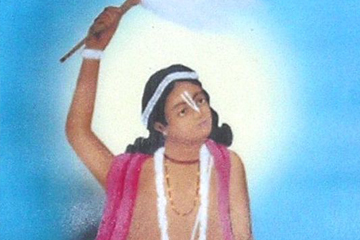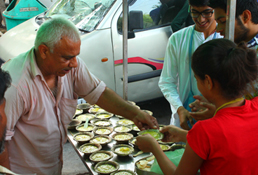Sri Narahari Sarkar Thakura was born at Sri Khanda. Sri Krsnadasa Kaviraja Gosvami describes that the residents of Sri Khanda formed a branch of the desire tree of love of God. “Sri Khan davasi (the residents of Sri Khanda) Mukunda and his son Raghu nandan were the thirty ninth branch of the tree, Narahari was the fortieth, Chiran Jiva the forty first and Sulocana the forty second. They were all big branches of the all merciful tree of Caitanya Mahaprabhu. They distributed the fruits and flowers of love of Godhead anywhere and everywhere. [Chaitanya Charitamrita Adi-lila 10:78-79] Srila Jagannatha das Babaji Maharaj once stated – “Navadwip is the abode of Goloka. Vrindavana is the abode of Gokula. And Sri Khanda is the abode of Vaikuntha.”
Sri Narahari Sarkar Thakura participated in all of Sri Gaurasundora’s pastimes. Bhakti Ratnakara states: “Sri Sarkar Thakura’s glories are most uncommon. In Braja he is known as Madhumati, whose good qualities are unlimited.” (thus proving he was not the author of it)
One day, Nityananda Prabhu arrived at Sri Khanda and said to Narahari, “All right, we know who you are. So where’s the honey, Madhu’ ?” In Krsna-lila, Narahari is the sakhi Madhumati, whose service is to supply honey for Sri Sri Radha-Govinda and Their associates. So he immediately went to a nearby pond and filled a pot which immediately turned into honey of the most nectarean kind. Nityananda Prabhu and His associates drank from this pot to their full and unlimited satisfaction.
Narahari dasa Sarakara was a very famous devotee. Locana dasa Thakura, the celebrated author of Sri Caitanya-mangala, was his disciple. In the Caitanya-mangala it is stated that Sri Gadadhara dasa and Narahari Sarakara were extremely dear to Sri Caitanya Mahaprabhu, but there is no specific statement regarding the inhabitants of the village of Srikhanta. (A.C. Bhaktivedanta Swami Prabhupada. Chaitanya Charitamrita Adi-lila 10:78-79.purport)
Sri Locana dasa Thakura was the dear disciple of Sri Narahari Sarkar. In his book Caitanya mangala he introduces his guru in this way: “My Thakur (spiritual master) is Sri Narahari das Thakura, who is very influential amongst the medical caste. He is continuously absorbed in Krsna-prema, and in fact his body knows nothing but Krsna. To his followers he speaks about nothing other than love of Krsna. He was previously known in Vrindavana-lila as Madhumati and was a storehouse of sweetness (honey), and very dear to Radharani. Now he is now present in Kali-yuga with Sri Gaurasundara as Sri Narahari. He is the keeper of the storehouse of love of Radha and Krsna.” [Sri Caitanya Mangal, Sutrakhanda]
This is supported in Gaura Ganod-desh dipika of Kavi-karnapura 177., wherein it is said:
pura madhumati prana-
shakhi vrindavane sthitaa
adhuna naraharya-akhyah
saarakarah prabhoh priyah
“Srimati Radharani’s dear friend, the Vraja-gopi named Madhumati-devi, appeared as Narahari Saarakaara, who was very dear to Lord Chaitanya”.
Srila Bhaktivinoda Thakura, in his Gaura-arati kirtana, sings of some of that intimate service to that he performed for Lord Chaitanya: ‘kiba narahari adikari chamara dhulaya’ “Narahari is fanning Gaurasundara with a yak-tail (chaumara) fan.”
Sri Narahari Sarkar Thakura was a very expert singer as well as poet. He has composed many songs about the pastimes of Lord Caitanya and Lord Nityananda. He composed a Sanskrit work entitled Sri Bhajanamrta. Gaurviraha-gita pada kalpataru is also attributed to him, although some scholar devotees doubt whether it is really his own composition.
Most of Narahari Sarkar Thakura’s songs have gotten mixed up with Narahari Chakravarti Thakura’s compositions (Narahari Chakravarti Thakura is the author of Bhakti-ratnakara). Therefore is difficult to ascertain which are actually his. Before the appearance of Sri Gaurasundara he also composed many songs about the pastimes of Sri Sri Radha and Krsna.
Narahari was the only devotee who had the adhikara (right) to do Gaura-kirtana in Gaurasundara’s presence. Ordinarily, if anyone would praise Mahaprabhu in His presence, or chant His Holy Name, He would block His ears and call out “Visnu! Visnu!” Narahari, however, enjoyed the special privilege of being able to sing about Mahaprabhu in a very unique mood and with sweet descriptions of His transcendental beauty without objection from Mahaprabhu.







